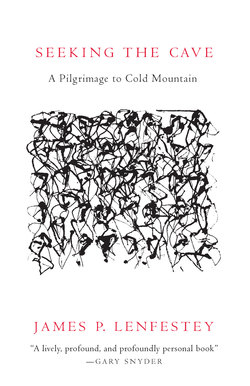Читать книгу Seeking the Cave - James P. Lenfestey - Страница 20
На сайте Литреса книга снята с продажи.
ОглавлениеCHAPTER SEVEN
BEIJING: THE BIGGEST BELL IN THE WORLD
Welcome to Beijing,” smiled Bill Porter outside the airport gate, one hand impishly waving at the gray translucent haze behind him. He was wearing a blue bandana tied around his neck under an abundant beard, a T-shirt, beltless pants, a stuffed monk’s bag hanging over his shoulder.
I had met Bill in person once before, in Port Townsend the prior June when I visited my daughters and grandchildren in nearby Seattle. I found him full of boundless energy with the irrepressible humor of a Han-shan. His blue eyes twinkled with delight. We worked out the details of our itinerary over green tea at his house high on a sand hill overlooking the Strait of Juan de Fuca. When finished, he took my arm and toured me around the wonders of Port Townsend, an old lumbering town experiencing an artistic renaissance.
His business card read “Translator.” In addition to The Collected Songs of Cold Mountain—the book that brought us together—he had translated volumes by monks such as Empty Bowl and Stonehouse, plus pivotal Buddhist texts, all evidencing tremendous scholarship augmented by a life of Zen practice and unrivaled travel experience in China. After studying mediation in New York while studying Chinese at Columbia, he moved to Taiwan, where he remained from 1972 to 1991, living in two Zen monasteries until 1976. In 1991 he moved to Hong Kong, hired by a Hong Kong radio station to travel the mysterious mainland. Over two years he sent back more than a thousand two-minute audio stories—covering everything from traveling China’s Wild West in a bus populated with drug smugglers to scaling the mountain aeries of forgotten hermits—before he returned to the United States in 1994 with his Taiwanese wife to raise his family. There could be no more knowledgeable guide to the literary and Buddhist landscape through the fun-house mirror of modern China.
Bill introduced the four of us to sweet-faced Mr. Chen, our driver for the first leg of our journey, a 1,100-mile trek to the ancient T’ang capital of Chang’an (Xi’an today), where Cold Mountain, like most literate Chinese, once battled the bureaucracy for a government job.
We loaded into Mr. Chen’s new Toyota van for the short trip to the heart of today’s capital city of nearly sixteen million people.
The oppressive grayness tasted of dust and smoke and pollution in some ghoulish brew, but the scramble of traffic—in Mr. Chen’s calm hands—seemed not dissimilar from that of any urban megalopolis of the late twentieth century. Once-fabled bicycle traffic was crowded onto shoulders by the burgeoning car and truck traffic of the economic miracle. Ironic, I thought, as we Americans busily stripe our streets to add bike lanes.
I had read that the government cruelly swept away old city neighborhoods to build the forest of towers disappearing into the soup around us. But Bill somehow managed to find us rooms in a bed and breakfast down one of the remaining residential alleys, called hutong. After asking local directions once or twice, Mr. Chen guided our van, nearly scraping both sides, into a rabbit warren remnant of China’s pedestrian past. A red door in a dusty terra-cotta wall opened into a quiet, modest courtyard, the residence of a once-famous opera singer. We registered, then collapsed into our beds for the night.
DAWN IN A BEIJING ALLEY
Only one cricket song for twenty million sleeping people?
How many hours since the last mosquito whine?
Already workers tap shiny new tiles,
hammer curbstones, spade in fresh shrubs.
Bicycle chains moan, trucks rattle and bang.
If only the air weren’t crazy with soot and dust.
Wait, is that birdsong I hear? And a sweeping broom?
Only a neighbor brushing his teeth, washing his shirt.
